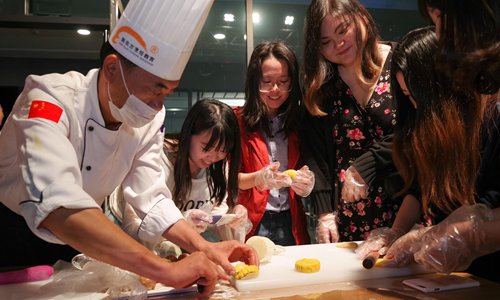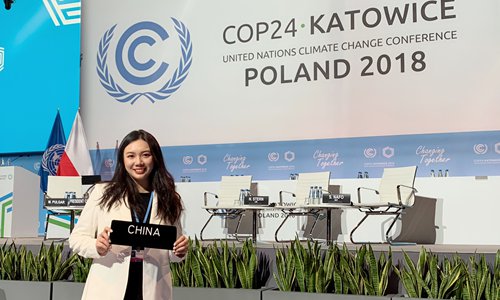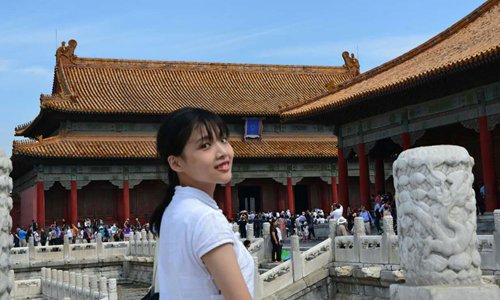HOME >> CHINA
Studying in mainland helps HK students embrace broad platforms, dispel stereotypes
By Zhang Dan Source:Global Times Published: 2019/9/18 19:13:40

More than 40 students from Hong Kong, Macao, and Taiwan studying in universities in Beijing celebrate the Mid-Autumn Festival with their mainland peers on September 12, 2019. Photo: VCG
Lo Wai Wun Ana is in her fourth year of undergraduate studies at Tsinghua University, the top domestically and 16th globally ranked university according to QS World University Rankings in 2019. From her accent, it is hard to tell that she is a Hongkonger.
Studying in Beijing brings Lo opportunities to better learn about not only China, but also the rest of the world, which she said has expanded her way of thinking and world outlook.
"When I was studying in Hong Kong, we often discussed the relationship between the Chinese mainland and Hong Kong, and the difference between Hongkongers and people on the mainland. But after I came to study at Tsinghua University, what I discussed was the different ways of thinking between Chinese and Europeans, and the relationship between China and other countries, which I had never paid attention to before in Hong Kong," Lo told the Global Times, adding that she now thinks more about the developing world and countries along the Belt and Road Initiative.
With the reputation and quality of higher education on the Chinese mainland gradually improving in recent years, a growing number of Hong Kong students are eyeing mainland universities due to the broader platform and abundant opportunities on offer.
According to statistics from the China Education Exchange (Hong Kong) Center, the number of students from Hong Kong who participated in a scheme that exempts them from having to sit the national college entrance exams to enter mainland colleges grew 9.2 percent this year, accounting for 6.25 percent of the total candidates who attended The Hong Kong Diploma of Secondary Education (HKDSE), the Xinhua News Agency reported in July.
Currently, a total of 112 universities and colleges on the mainland are included in the exemption project, and 1,556 students from Hong Kong were enrolled in mainland universities in this way last year, Xinhua said.

Lo Wai Wun Ana attended the COP 24 Katowice in Poland, in December 2018 as a member of China's climate talks team. Photo: Courtesy of Lo Wai Wun Ana
What mainland can give
Lo said the most interesting part of her studies at the School of Environment at Tsinghua University was climate talks. Thanks to the prestige of the university and the resources it can provide, she got an opportunity to intern at the National Development and Reform Commission after going through fierce competition.
"As a member of the Chinese negotiating team, I attended many UN meetings, such as COP 24 Katowice 2018 in Poland. I think I wouldn't have had such opportunities if I had studied in Hong Kong and interned at the Government of the Hong Kong Special Administrative Region (HKSAR)," Lo said, noting that Beijing is a better place to study international negotiations compared with Hong Kong.
Another thing that impressed Lo at Tsinghua is the rich learning environment there.
Her family was also shocked that some of Lo's classmates are top scorers in China's national college entrance examinations.
Another Hong Kong student at Peking University, Lam Tsz Kam, echoed Lo's view, noting his classmates are very diligent. "They are not only hardworking academically, but are also striving to take part in entrepreneurship programs with the school's platform, which is very smart," Lam told the Global Times.
Inspired by his mainland friends, Lam started to do internships at different organizations during his undergraduate study.
At the Beijing Office of the Government of the HKSAR, Lam is responsible for reporting on northern China's macroeconomic policy.
Moreover, he has produced brochures to encourage more Hong Kong students to further their studies in the mainland.
Lam also previously carried out surveys at a village in Suining county, Central China's Hunan Province, as part of the local government's poverty alleviation work. While these places may seem unfamiliar to Hongkongers, they allow the Hong Kong youths to better understand the complexity of China.

Cheng Ho Ying visited The Forbidden City right after she arrived in Beijing in 2015 due to her love for the Chinese historical site. Photo: Courtesy of Cheng Ho Ying
Mentality transformedSeveral Hong Kong students reached by the Global Times acknowledged their former understanding of mainland society was a stereotype depicted by Hong Kong media and what they had seen and heard in Hong Kong.
After studying in the mainland, they started to reflect on their prejudices and gain a better understanding of its society and people.
"Before I came to Beijing, I thought mainland people's way of thinking was very conservative, which I found is not true after I studied here. For instance, some students love to voice and write articles to air their opinions on politics, economy and history," Lam said, noting that many mainland students have their own thoughts and their suggestions are constructive.
Lo agreed that some Hongkongers still think the mainland is backward, an opinion she also used to hold, even though top tier cities like Beijing, Shanghai and Guangzhou have developed at an astonishing speed in recent years.
"Hongkongers need some time to get used to the development speed of the Chinese mainland," Lo noted.
What made these students change their opinions about the mainland is perhaps the warmth and friendliness they felt from the people around them, which is in contrast with the news of mainland tourists' impolite behavior in Hong Kong.
By making friends with mainland students and living with them together in one dormitory, Lam not only grasped Mandarin but also Hokkien (Southern Fujian dialect) - the language his father speaks.
In Cheng Ho Ying's words, the mainland has vast territory and abundant resources, making it a better place to learn about Chinese history and protect historical sites.
Cheng completed her undergraduate studies at Renmin University and has now started her master's at Tsinghua. In her first week after arriving in Beijing, senior students at Renmin University showed her around the Great Wall, The Forbidden City and Summer Palace.
"I felt the journey has not been made in vain," Cheng said, "After I came here, I found the mainland is really a vibrant land with room for growth, which allows me to play a role - not only participating in its development, but also contributing to it."
Newspaper headline: Changing attitudes
RELATED ARTICLES:
Posted in: IN-DEPTH